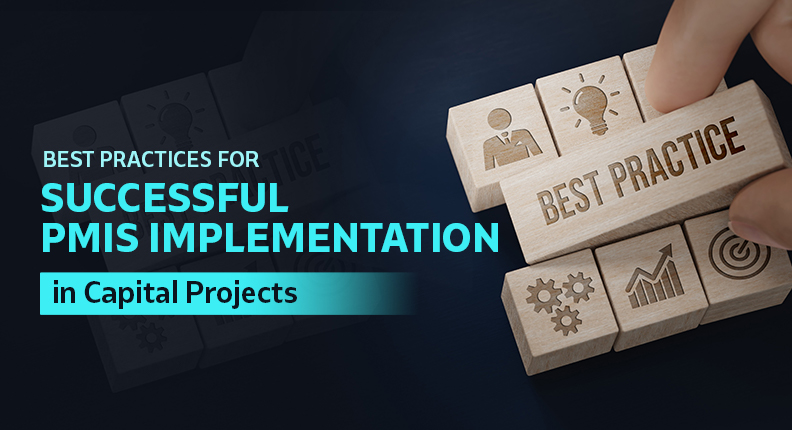Capital project management is a challenging endeavor. A precise fusion of planning, technical expertise, and collaboration is needed to ensure that projects are finished on time, within budget, and by stakeholder expectations. A project management information system (PMIS) is an effective instrument that can significantly increase the efficiency of this procedure.
Project Management Information System (PMIS) is a potent software that ensures accuracy and helps data management throughout the project’s lifecycle. As a central platform, it efficiently manages data, generates reports, schedules tasks, allocates resources, assigns roles, and streamlines workflows. PMIS is the foundation for the whole capital project, from start to completion. It offers an adaptable framework for data management and format storage, ensuring seamless operations and efficient team communication. This all-inclusive method improves coordination and efficiency, which leads to practical project outputs.
Therefore, this blog will discuss the best practices for implementing PMIS in capital projects. These will ensure that you meet your objectives and consistently deliver winning outcomes.
Best Practices for Successful PMIS Implementation in Capital Projects

Implementing a PMIS in capital projects is a game changer, but success relies on following key best practices. From understanding project needs and selecting the right software to stakeholder involvement and ongoing optimization, each step ensures smoother execution, enhanced collaboration, and maximized project outcomes. Let’s see how these strategies work in detail below:
1. Understand the Core Needs of Your Capital Project
Before implementing any technology in your capital project, it’s essential to understand its core needs first. When adopting a Project Management Information System (PMIS), ensure you clearly understand your project’s specific requirements and objectives. Every capital project has a unique scope, goals, and challenges, whether managing timelines, costs, or risks.
By assessing these early, you ensure that the PMIS is tailored to your project’s requirements, avoiding unnecessary features and ensuring smooth execution. OnIndus takes a proactive approach by identifying these core elements early on and customizing the PMIS to align with the project’s unique demands, ensuring that all critical aspects are effectively addressed.
2. Choose the Right PMIS Software
It’s important to understand that the features and functionality of all PMIS differ, choosing the right one is a key decision for any project manager in a capital project. The project manager seeks a solution to grow with the project and meet immediate requirements. When selecting the appropriate choice of PMIS, considerations such as ease of use, adaptability, compatibility with existing tools, and technical assistance are essential. Choosing a flexible and adaptive PMIS ensures that it will assist your project from the beginning to completion instead of becoming a barrier when requirements evolve.
OnIndus can help you navigate the vast array of PMIS options to choose the one that best fits your project needs. With expertise in industry-leading PMIS platforms, OnIndus ensures that your selected software is scalable, user-friendly, and tailored to your project’s complexity.
3. Involve Stakeholders Early
Stakeholder engagement is vital to the success of a PMIS implementation. Including essential stakeholders early on ensures that their opinions are taken into account and that they are aware of the PMIS’s features and advantages. Stakeholders can offer insightful information, assisting in aligning the PMIS with the team’s workflow to ensure that the PMIS is seen as an asset rather than a disruption
4. Establish Clear Data Management Protocols
Since data is the foundation of any PMIS, setting up explicit data management procedures is important. Determine the methods for gathering, storing, and accessing data before implementing the system. Ensure that your data management procedures are transparent, safe, and consistent. Establishing clear protocols not only facilitates effective data organization for projects but also helps avoid confusion or data silos later on. Everyone will be able to get the information they require, and collaboration will be enhanced with an organized approach to data handling.
5. Ensure Proper Training and Support
If your team isn’t adequately trained to use PMIS, then even the best one won’t be effective. It’s important to prioritize thorough training throughout the implementation phase. This covers training during the initial setup and continuing assistance for any problems or inquiries. Provide tutorials and guides to acquaint users with the system’s features and operations. With the proper training, your team can make the most of the PMIS, increasing its value and ensuring seamless daily operations.
Optimizing a PMIS’s benefits requires both proper training and continuous assistance. OnIndus provides comprehensive PMIS training sessions covering all facets of your PMIS, from fundamental functions to advanced features. Additionally, OnIndus provides continuous support, ensuring that your team can quickly resolve any issues, utilize the PMIS to its full potential, and maintain productivity throughout the project’s lifecycle.
6. Implement Gradually, Not All at Once
Implementing PMIS gradually instead of all at once may be more efficient. Implementing the new system gradually allows your team to become accustomed to it without overburdening, minimizing interruptions to ongoing project activity. This approach also facilitates input at every turn, ensuring ongoing enhancements through the deployment phase.
7. Focus on Integration with Other Systems
A PMIS cannot exist in isolation; it must integrate seamlessly with current tools and software to deliver optimal results. Your current project using tools, including scheduling software, budgeting tools, and communication platforms, must integrate seamlessly with the PMIS. Concentrating on integration may reduce the need for redundant data and optimize your operations. This creates a single source of truth for all project data, improving efficiency and resulting in a unified project ecosystem.
OnIndus excels at creating tailored integrations between your PMIS and other essential project management tools. Whether it’s budgeting software, scheduling platforms, or collaboration tools, OnIndus ensures that your systems communicate effectively, creating a unified project environment that streamlines operations and eliminates inefficiencies.
8. Prioritize Security and Compliance
Ensuring security and compliance is crucial due to the sensitive nature of project data, including stakeholder and financial data. When implementing a PMIS, prioritize strong security measures, such as data encryption, user access limits, and frequent security audits. Ensure your system also conforms with all applicable industry standards and regulations. Maintaining a high level of security preserves your data and fosters stakeholder trust.
OnIndus prioritizes robust security measures in every PMIS implementation, ensuring data encryption, access controls, and regular security updates.
9. Monitor Progress and Optimize as Needed
Continuous monitoring and optimization are crucial for aligning your PMIS with project goals. Monitor system utilization regularly, identify areas for improvement, and make required corrections. By monitoring developments, you can identify inefficiencies or bottlenecks early on and prevent them from getting worse. By continuously optimizing your PMIS, you may maintain its alignment with project goals and value throughout the project lifecycle.
10. Measure Success and Gather Feedback
It is crucial to evaluate your PMIS’s effect on project performance once it has been implemented. Establish key performance indicators (KPIs) that correspond with your project goals, such as decreased costs, increased cooperation, or time savings. Measure these outcomes to determine the success of your PMIS implementation. Additionally, gather user feedback to identify any pain points or areas where the system can be improved. Engaging with your team helps refine the system, ensuring it continues delivering value.
11. Conduct Post-Implementation Optimization
Post-implementation optimization must be carried out to ensure long-term success. Check the system from time to time to make sure it is still suitable for your project needs. As your project expands or evolves, it could be necessary to update or reconfigure your PMIS. Regular optimization ensures your system grows alongside your project, enabling continuous improvement and sustained efficiency.
OnIndus provides post-implementation services to revisit your PMIS, making adjustments as needed to ensure it meets your project’s evolving demands.
These best practices will position your PMIS for effective use and build a solid foundation for your capital projects, helping them provide dependable and consistent results.
Takeaway
A project management information system (PMIS) is a long-term investment that increases the effectiveness and success of capital projects when implemented correctly and regularly optimized. When a PMIS is aligned with your project’s requirements and objectives, it may add value by promoting return on investment (ROI) through enhanced decision-making, expedited procedures, and increased transparency.
OnIndus assists you with PMIS implementation. We also provide ongoing support and continuous optimization to ensure your system continues to deliver benefits long after it is initially installed. Beyond just implementing PMIS, we offer data integration, change management, and customized software solutions that are made to fit the specific needs of your project.
To stay updated on industry trends, tips, and exclusive insights, follow us on LinkedIn. We frequently host webinars and knowledge-sharing sessions where we discuss how our solutions can help your organization thrive in an evolving landscape. Don’t miss out on these opportunities to engage with our experts and learn how OnIndus can transform your capital projects for maximum ROI.
To elevate your capital project management to the next level, connect with OnIndus today for expert PMIS support to meet your evolving needs.

